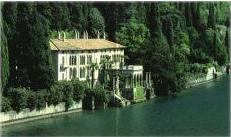International
School of Physics "Enrico Fermi"

Program
Lectures, student highlights
and posters
Application Form
Location
Travel Information
Varenna, Italy, July 5th-15th, 2005
Quantum Computers, Algorithms and Chaos
Directors:
G. Casati (Como), D.L. Shepelyansky (Toulouse),
P. Zoller (Innsbruck)
Scientific Secretary: G. Benenti (Como)
Quantum computation is an emerging interdisciplinary field, which takes
advantage of concepts from both information theory and quantum
mechanics.
During the last decade great progress has been made in the
understanding of
how
quantum computing and quantum communications can be performed and
efficient
algorithms and communication protocols have been developed.
Due to the massive parallelism of quantum evolution certain quantum
algorithms
demonstrate an exponential gain compared to algorithms based on
classical
dynamics. In fact, a quantum computer represents a complex system of
many
coupled qubits, which in general can be viewed as a many-body
interacting
quantum system. On the other hand, qubit or spin interactions have also
been
studied extensively in the field of quantum chaos, in which typical
problems
are decoherence and the quantum-to-classical transition, subjects that
are
also
essential for any realistic implementation of a quantum computer.
Understanding
the connections between these fields may provide interesting cross
fertilization of both fields.
The aim of the school is to provide the background and to introduce
participants
to recent achievements in these rapidly developing directions of
research.
The
main accent will be on the theory of quantum-computer algorithms,
error-correcting codes, decoherence and quantum chaos effects in the
exponentially large Hilbert space of quantum computers. The
understanding of
these theoretical problems is vital for the ultimate technological
success
of
quantum computation.
The School will deal with the following topics:
- Introduction to quantum computing
- Quantum logic, information and entanglement
- Quantum algorithms
- Error-correcting codes for quantum computations
- Quantum measurements and control
- Quantum communication
- Quantum optics and cold atoms for quantum information
- Quantum computing with solid state devices
- Theory and experiments for superconducting qubits
- Interactions in many-body systems: quantum chaos, disorder and
random matrices
- Decoherence effects for quantum computing
- Future prospects of quantum information processing
List of confirmed lecturers and topics:
- D. Averin (Stony Brook)
- Measurements in superconducting qubits
- C.W.J. Beenakker (Leiden)
- Random matrix theory, entanglement in mesoscopic structures
- G. Benenti (Como)
- Quantum chaos in many-body systems, decoherence effects for
quantum computing
- I. Bloch (Mainz)
- Ultracold quantum gases for quantum information
- D. Bouwmeester (Santa Barbara)
- Quantum communication with entangled photons
- H.J. Briegel (Innsbruck)
- Quantum information and entanglement, one-way quantum computer
- N. Davidson (Weizmann)
- Echo spectroscopy, stability and decoherence in cold atoms
- J. Eschner (Barcelona)
- Quantum computation with trapped ions
- D. Esteve (Saclay)
- Experimental progress in superconducting qubits
- R. Fazio (Pisa)
- Quantum computation with solid state devices, theoretical aspects
of superconducting qubits
- B. Georgeot (Toulouse)
- Quantum algorithms and quantum chaos
- M. Grassl (Karlsruhe)
- Quantum error-correcting codes
- R. Laflamme (Waterloo)
- Quantum algorithms, linear optics quantum computation
- H. Mabuchi (Caltech)
- Quantum measurements and quantum control
- A. Steane (Oxford)
- Error-correcting codes for quantum computing
- P. Tombesi (Camerino)
- Entanglement in quantum optics
- L.M.K. Vandersypen (Delft)
- Quantum computing with quantum dots
- G. Vidal (Caltech)
- Entanglement, quantum computation and critical phenomena
The program is available via the link given above - It includes
oral presentations of selected research results obtained by the students
Sponsors:
Universita` degli Studi
dell'Insubria, Italy
FET-QIPC programme of European Union
UNESCO-ROSTE
U.S. Army European Research Office
Istituto Nazionale di Fisica Nucleare
Fondazione Cariplo

